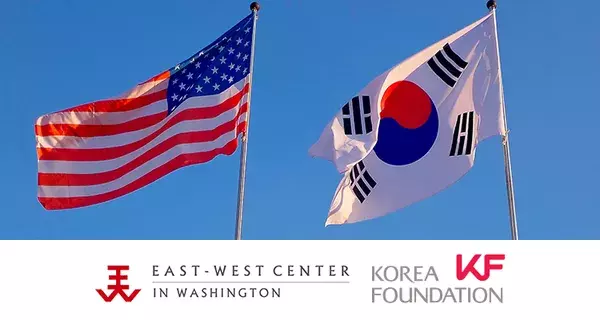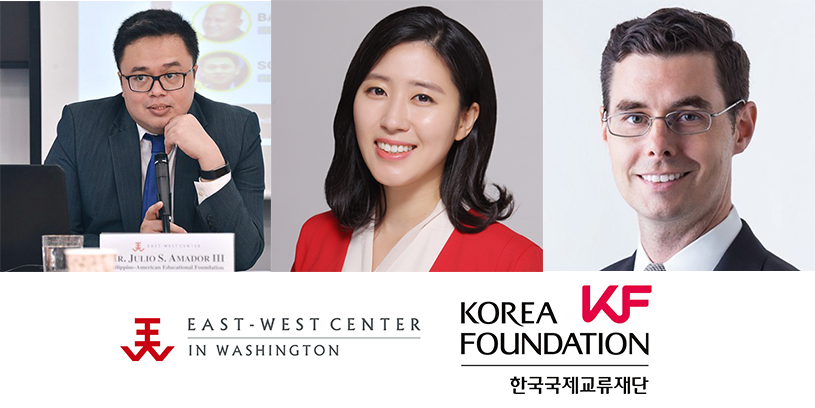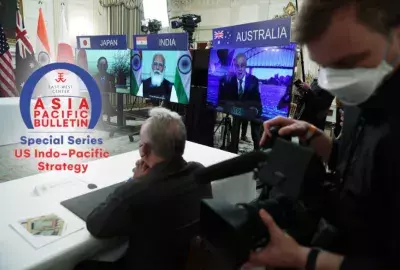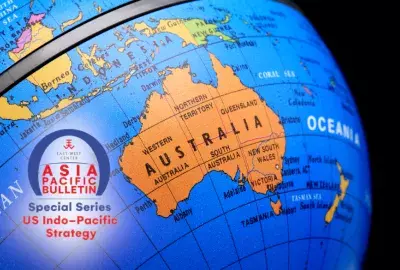Error message

| Julio Amador, Executive Director at the Philippine American Educational Foundation and Interim President of the Foundation for the National Interest, explains that “…A trilateral initiative would depend on two critical factors: 1) the growing ties between the Philippines and South Korea and 2) the extension of South Korea’s commitment beyond peninsular affairs to encompass the entire region.” |

A recording of a companion webinar to this piece will be published on this East-West Center events page when available.
This piece and its companion webinar were produced as a part of the United States-Republic of Korea (ROK) Cooperation in Southeast Asia: Trade, Investment, and Multilateralism webinar series and online, collaborative policy research program, a joint effort between the East-West Center in Washington and the Korea Foundation, which generously sponsors the program
It is possible for the United States (US), the Republic of Korea (South Korea), and the Republic of the Philippines (the Philippines) to pursue increased trilateral security cooperation as the three countries seek to respond to a more uncertain strategic environment in the Indo-Pacific region. History and more recent developments offer insights into the possibilities for such trilateral security cooperation.
The three states and their respective relationships converged during the Korean War. During this conflict, all three fought for the principles of democracy centered on freedom and peaceful coexistence. The battle of Yultong is evidence that the three states can face a common aggressor. Although wartime cooperation did not result in a trilateral security agreement, there are signs that the countries’ relationships with each other have matured since the Korean War. All three agree that the Indo-Pacific region should adhere to a rules-based international order and see states such as China and North Korea as risks to that order. However, priorities vary greatly between the three states: South Korea prioritizes its neighbor North Korea as the immediate threat, whereas the Philippines is focused on China. The United States is focused on both. Likewise, while all three nations are committed to free and open seas, the challenges they face in exemplifying this commitment vary substantially. The Philippines under the Duterte administration and South Korea under the Moon administration have tried to balance ties with the United States and China; carefully navigating relations even as both countries remain US allies. The United States has moved towards a more explicit policy of “strategic competition” with China that has had difficulty in attaining open and vocal support from regional states including South Korea and the Philippines
Bilateral defense and maritime cooperation are already evident among the three states. While cooperation is opportunistic and ad hoc, these interactions offer a solid foundation for a trilateral initiative. For example, both the Philippines and South Korea are recipients of US support, and South Korea has contributed to the military modernization of the Philippines since 2019. Additionally, the United States and South Korea used the 2016 Arbitration Award won by the Philippines to reinforce the rule of law in the region and have reaffirmed their respective commitments to enhance Philippine security. With all three states sharing strong bilateral ties, a trilateral initiative would then depend on two critical factors: 1) the growing ties between the Philippines and South Korea and 2) the extension of South Korea’s commitment beyond peninsular affairs to encompass the entire region. The continuation of Seoul’s New Southern Policy remains to be seen as the country enters its election season.
However, there are several challenges for the three states to consider:
- A trilateral framework will have to be finalized. All parties must agree on what values to codify and emphasize in the framework or, at the very least, reach an informal arrangement that accommodates all three countries. A discussion and deliberation on the shared values and priorities from each country is a good starting point
- The different defense and economic capacities of each state need to be considered. Accounting for these differences will help establish feasible terms for trilateral cooperation and direct the specifics of further cooperation.
- The Philippines must address its poor defense posture, which is currently reliant on foreign procurement and support. Negotiating a trilateral framework will force the Philippines to reexamine its defense and foreign policies, looking both outwards (for alliance/partner support) and inwards (reinforcing self-reliant defense strategies for the long run).
- Economic ties cannot be left on the backburner. Apart from the need to increase the US economic footprint in the region, the Philippines and South Korea will have to play catch-up by finalizing a free trade agreement. Finalization of the free trade between the two is underway as of late 2021.
- External resistance to deeper trilateral cooperation must be overcome. The view of South Korea’s neighbors needs to be taken into consideration, as Japan’s, China’s, and even North Korea’s reaction can potentially affect the whole region and subsequently peninsular affairs.
The ever-evolving complexities of the South China Sea region show that shared socio-political history is just one ingredient—among many others—that makes initiatives and cooperation successful. A lot more needs to be done before the three countries can enter some form of a trilateral initiative. Preliminary among these is the pursuit of more robust economic relations between the three countries and throughout the region. The defense relations between the three are already in the early formative stages whereas a comprehensive economic strategy from Washington remains wanting. Moreover, it is pivotal for the United States to underwrite an economic strategy beyond defense - one in conjunction with its allies and partners and one that can potentially convince the rest of Southeast Asia. Next, the three countries must informally work together on key issues of mutual interest. These issues–including maritime security, transfers of industrial technology, anti-crime measures, climate change, and many others–can be enshrined in the initiative. Trilateral measures and systems between the three must be consistent with the ASEAN-led security framework.
South Korea has longstanding and profound ties with the Philippines. On top of Seoul’s strong people-to-people linkages, diasporas, and well-stretched soft power influence in Manila, the two countries are in the early stages of finalizing a free trade agreement that could pave the way for complex arrangements in the future. On the defense side, South Korea recently donated the decommissioned Pohang-class corvette ROKS Andong (PCC-771) to the Philippines, following up a 2019 donation of another Pohang-class corvette. This support demonstrates that Seoul is not only willing to play the defense diplomacy game, but it is also aware that the Philippines’ weak maritime capacity will not allow the latter to play a critical role in any maritime-related incident.
These developments complement Manila and Washington robustly affirming the alliance and identifying areas for closer cooperation in the joint statement from the 9th US-Philippines Bilateral Strategic Dialogue. Moreover, the Philippine government judiciously handled maritime incidents at Ayungin Shoal, in which the Chinese Coast Guard harassed vessels resupplying Philippine marines stationed at the BRP Sierra Madre. In a show of support, the United States issued a statement condemning the harassment. These coordinated efforts prove the two countries can manage their way out of an alliance crisis and adroitly navigate flashpoints.
the trilateral initiative between the United States, South Korea, and the Philippines could only work when a trilateral framework has been made and each member is aware of its role in the effort. Hence, there is a need for extensive discussion and compromise between all three states. The three countries may begin where their interests in traditional and non-traditional security issues align. This approach, in the long durée, gives Seoul, Washington, and Manila, a good foundational basis for initial cooperation.
| Julio Amador, Executive Director at the Philippine American Educational Foundation and Interim President of the Foundation for the National Interest, explains that “…A trilateral initiative would depend on two critical factors: 1) the growing ties between the Philippines and South Korea and 2) the extension of South Korea’s commitment beyond peninsular affairs to encompass the entire region.” |

A recording of a companion webinar to this piece will be published on this East-West Center events page when available.
This piece and its companion webinar were produced as a part of the United States-Republic of Korea (ROK) Cooperation in Southeast Asia: Trade, Investment, and Multilateralism webinar series and online, collaborative policy research program, a joint effort between the East-West Center in Washington and the Korea Foundation, which generously sponsors the program
It is possible for the United States (US), the Republic of Korea (South Korea), and the Republic of the Philippines (the Philippines) to pursue increased trilateral security cooperation as the three countries seek to respond to a more uncertain strategic environment in the Indo-Pacific region. History and more recent developments offer insights into the possibilities for such trilateral security cooperation.
The three states and their respective relationships converged during the Korean War. During this conflict, all three fought for the principles of democracy centered on freedom and peaceful coexistence. The battle of Yultong is evidence that the three states can face a common aggressor. Although wartime cooperation did not result in a trilateral security agreement, there are signs that the countries’ relationships with each other have matured since the Korean War. All three agree that the Indo-Pacific region should adhere to a rules-based international order and see states such as China and North Korea as risks to that order. However, priorities vary greatly between the three states: South Korea prioritizes its neighbor North Korea as the immediate threat, whereas the Philippines is focused on China. The United States is focused on both. Likewise, while all three nations are committed to free and open seas, the challenges they face in exemplifying this commitment vary substantially. The Philippines under the Duterte administration and South Korea under the Moon administration have tried to balance ties with the United States and China; carefully navigating relations even as both countries remain US allies. The United States has moved towards a more explicit policy of “strategic competition” with China that has had difficulty in attaining open and vocal support from regional states including South Korea and the Philippines
Bilateral defense and maritime cooperation are already evident among the three states. While cooperation is opportunistic and ad hoc, these interactions offer a solid foundation for a trilateral initiative. For example, both the Philippines and South Korea are recipients of US support, and South Korea has contributed to the military modernization of the Philippines since 2019. Additionally, the United States and South Korea used the 2016 Arbitration Award won by the Philippines to reinforce the rule of law in the region and have reaffirmed their respective commitments to enhance Philippine security. With all three states sharing strong bilateral ties, a trilateral initiative would then depend on two critical factors: 1) the growing ties between the Philippines and South Korea and 2) the extension of South Korea’s commitment beyond peninsular affairs to encompass the entire region. The continuation of Seoul’s New Southern Policy remains to be seen as the country enters its election season.
However, there are several challenges for the three states to consider:
- A trilateral framework will have to be finalized. All parties must agree on what values to codify and emphasize in the framework or, at the very least, reach an informal arrangement that accommodates all three countries. A discussion and deliberation on the shared values and priorities from each country is a good starting point
- The different defense and economic capacities of each state need to be considered. Accounting for these differences will help establish feasible terms for trilateral cooperation and direct the specifics of further cooperation.
- The Philippines must address its poor defense posture, which is currently reliant on foreign procurement and support. Negotiating a trilateral framework will force the Philippines to reexamine its defense and foreign policies, looking both outwards (for alliance/partner support) and inwards (reinforcing self-reliant defense strategies for the long run).
- Economic ties cannot be left on the backburner. Apart from the need to increase the US economic footprint in the region, the Philippines and South Korea will have to play catch-up by finalizing a free trade agreement. Finalization of the free trade between the two is underway as of late 2021.
- External resistance to deeper trilateral cooperation must be overcome. The view of South Korea’s neighbors needs to be taken into consideration, as Japan’s, China’s, and even North Korea’s reaction can potentially affect the whole region and subsequently peninsular affairs.
The ever-evolving complexities of the South China Sea region show that shared socio-political history is just one ingredient—among many others—that makes initiatives and cooperation successful. A lot more needs to be done before the three countries can enter some form of a trilateral initiative. Preliminary among these is the pursuit of more robust economic relations between the three countries and throughout the region. The defense relations between the three are already in the early formative stages whereas a comprehensive economic strategy from Washington remains wanting. Moreover, it is pivotal for the United States to underwrite an economic strategy beyond defense - one in conjunction with its allies and partners and one that can potentially convince the rest of Southeast Asia. Next, the three countries must informally work together on key issues of mutual interest. These issues–including maritime security, transfers of industrial technology, anti-crime measures, climate change, and many others–can be enshrined in the initiative. Trilateral measures and systems between the three must be consistent with the ASEAN-led security framework.
South Korea has longstanding and profound ties with the Philippines. On top of Seoul’s strong people-to-people linkages, diasporas, and well-stretched soft power influence in Manila, the two countries are in the early stages of finalizing a free trade agreement that could pave the way for complex arrangements in the future. On the defense side, South Korea recently donated the decommissioned Pohang-class corvette ROKS Andong (PCC-771) to the Philippines, following up a 2019 donation of another Pohang-class corvette. This support demonstrates that Seoul is not only willing to play the defense diplomacy game, but it is also aware that the Philippines’ weak maritime capacity will not allow the latter to play a critical role in any maritime-related incident.
These developments complement Manila and Washington robustly affirming the alliance and identifying areas for closer cooperation in the joint statement from the 9th US-Philippines Bilateral Strategic Dialogue. Moreover, the Philippine government judiciously handled maritime incidents at Ayungin Shoal, in which the Chinese Coast Guard harassed vessels resupplying Philippine marines stationed at the BRP Sierra Madre. In a show of support, the United States issued a statement condemning the harassment. These coordinated efforts prove the two countries can manage their way out of an alliance crisis and adroitly navigate flashpoints.
the trilateral initiative between the United States, South Korea, and the Philippines could only work when a trilateral framework has been made and each member is aware of its role in the effort. Hence, there is a need for extensive discussion and compromise between all three states. The three countries may begin where their interests in traditional and non-traditional security issues align. This approach, in the long durée, gives Seoul, Washington, and Manila, a good foundational basis for initial cooperation.







